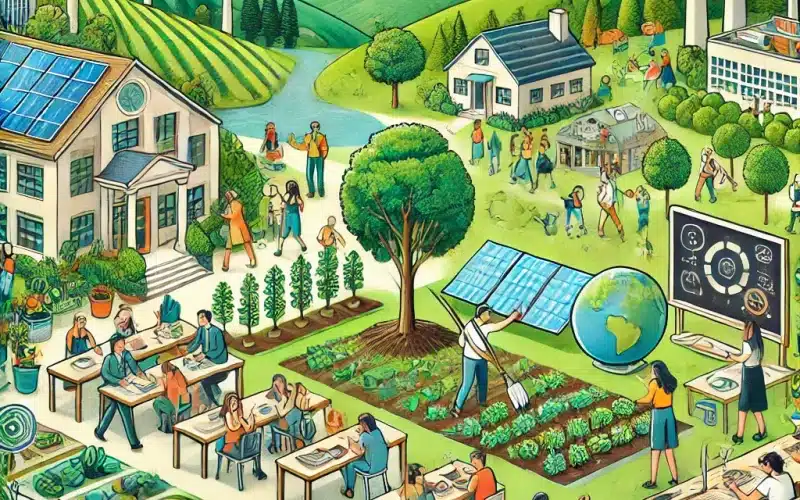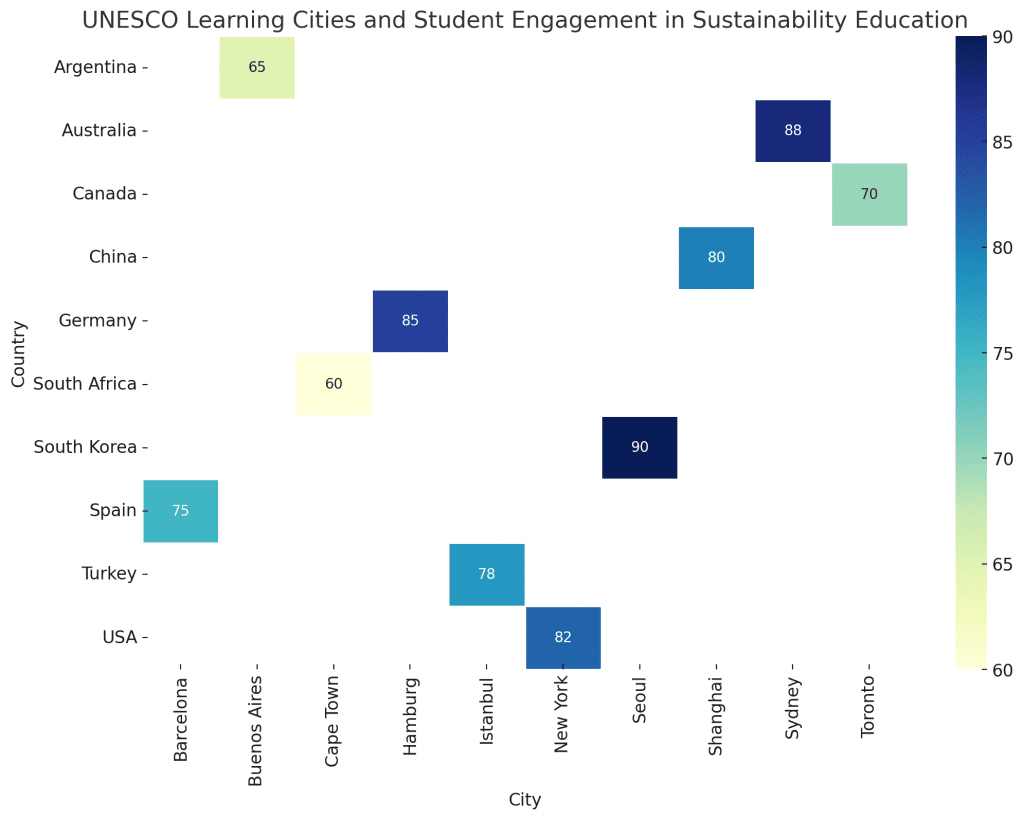
In today’s rapidly evolving world, the integration of sustainability into lifelong learning has become a crucial strategy for addressing the multifaceted challenges posed by environmental, social, and economic issues. This article explores the significance of embedding sustainability principles within lifelong learning frameworks and how it benefits individuals, communities, and society at large.
- 1 Why are Lifelong Learning and Sustainability such a good fit?
- 2 Timeline of Lifelong Learning Initiatives
- 3 Leading Countries in Sustainability Education
- 4 Statistics on the Importance of Integrating Sustainability into Lifelong Learning
- 5 Integration of Sustainability into Lifelong Learning is not just Beneficial but Necessary
Why are Lifelong Learning and Sustainability such a good fit?
Enhanced Adaptability and Resilience
Lifelong learning promotes continuous skill development and adaptability, enabling individuals to keep pace with new sustainable technologies and practices. This adaptability is essential in a world where sustainability challenges and solutions are constantly evolving. For instance, educational programs like Columbia University’s Master of Science in Sustainability Management provide mid-career professionals with the knowledge to address real-world environmental challenges effectively.
Promoting Sustainable Practices
By integrating sustainability into lifelong learning, individuals develop a deeper understanding of environmental issues, leading to more sustainable behaviors both at home and in the workplace. Educational initiatives encourage the adoption of sustainable practices, fostering a culture of environmental stewardship. This is evident in EU projects like the Erasmus+ “Ecological, what else?” which integrates sustainability into school curricula and operations, promoting sustainable mindsets among students and staff.
Supporting Economic and Social Development
Lifelong learning that includes sustainability education supports sustainable economic growth and social development. It helps create green jobs and promotes economic resilience by equipping the workforce with skills needed in a sustainable economy. The EU’s recommendations on lifelong learning for the green transition emphasize the need for high-quality education and training to support sustainable development goals, including job creation and social inclusion.
Holistic Problem-Solving
Sustainability issues are complex and interconnected, requiring holistic and interdisciplinary approaches. Lifelong learning encourages such approaches, enabling learners to understand and address the multifaceted nature of sustainability challenges. Programs like the Una Europa Lifelong Learning Certificate in Sustainability provide a comprehensive understanding of sustainability issues in sectors like waste and water management, preparing learners to tackle these challenges effectively.
Empowering Communities
Community-based lifelong learning initiatives play a vital role in promoting local sustainability efforts. These programs engage community members in sustainability projects, enhancing collective action and community resilience. For example, the Surrey Lifewide Learning Award in the UK supports community members in engaging in activities that benefit their local environment and society.
Meeting Global Goals
Lifelong learning is integral to achieving the United Nations’ Sustainable Development Goals (SDGs). It supports SDG 4 (quality education) and contributes to other goals such as SDG 13 (climate action) and SDG 11 (sustainable cities and communities) by fostering the necessary skills and knowledge to support these objectives. UNESCO emphasizes the role of lifelong learning in achieving the SDGs by promoting inclusive, equitable quality education and lifelong learning opportunities for all.
Building a Sustainable Future
Integrating sustainability into lifelong learning prepares current and future generations to live sustainably. It encourages responsible citizenship, where individuals are aware of their impact on the environment and equipped to take proactive steps towards sustainability. This approach is essential for fostering a culture of sustainability that permeates all aspects of life and work, ensuring a sustainable future for all.
Timeline of Lifelong Learning Initiatives
Develop a timeline showcasing the evolution of major lifelong learning initiatives focused on sustainability. This can include key milestones, policy implementations, and significant educational programs.
Example Timeline Milestones:
- 2015: Adoption of the Sustainable Development Goals (SDGs) by the UN.
- 2016: Launch of Erasmus+ projects focusing on sustainability in education.
- 2019: EU recommendations on lifelong learning for the green transition.
- 2021: Turkey’s association with Horizon Europe and Erasmus+.
Here is a heatmap showing the concentration of UNESCO learning cities and their student engagement in sustainability education. The heatmap illustrates the percentage of student engagement in sustainability education across various cities, providing a clear visual representation of how different UNESCO learning cities are performing in this area.

And this is the heatmap showing the concentration of UNESCO learning cities in Europe and their student engagement in sustainability education. The heatmap visualizes the percentage of student engagement in sustainability education across various European cities, highlighting the performance of each city in this critical area.

Leading Countries in Sustainability Education
Several countries are recognized for their strong commitment to integrating sustainability into their education systems and broader societal practices. Here are some of the top performers:
- Finland:
- Finland consistently ranks high in sustainability education, emphasizing clean air and renewable energy. Finnish businesses aim to achieve 50% renewable energy consumption by 2030 (The Sustainable Living Guide).
- Denmark:
- Denmark leads in overall environmental performance, focusing on clean energy and innovative green policies. The country has robust measures in place to reduce carbon emissions and promote sustainable living (World Economic Forum) (World Economic Forum).
- Sweden:
- Sweden aims to become the first fossil-fuel-free country by 2050. A significant portion of the population actively purchases eco-labeled products, demonstrating strong public engagement in sustainability (The Sustainable Living Guide).
- Norway:
- Norway excels in promoting electric vehicles, with nearly 60% of new cars being electric. The country also generates 97% of its electricity from renewable sources, highlighting its commitment to a sustainable future (The Sustainable Living Guide).
- United Kingdom:
- The UK is noted for its low CO2 growth rate and high standards in clean drinking water and marine protection. Recent policies, such as the ban on plastic straws, reflect its proactive approach to sustainability (The Sustainable Living Guide).
- France:
- France mandates green building practices and promotes cycling infrastructure, reflecting its leadership in environmental initiatives. The country continues to implement policies that support the goals of the Paris Climate Agreement (The Sustainable Living Guide).
- Germany:
- Germany is working towards closing its last nuclear power plant and transitioning entirely to renewable energy sources. The country’s commitment to reducing meat consumption and promoting veganism also contributes to its sustainability efforts (The Sustainable Living Guide).
Statistics on the Importance of Integrating Sustainability into Lifelong Learning
These statistics underline the critical role of lifelong learning in promoting sustainability and addressing global educational and environmental challenges.
- Global Learning Crisis:
- 617 million children and adolescents worldwide are unable to read or perform basic math, highlighting the need for improved learning outcomes through lifelong learning initiatives (UNESCO UIS).
- Lifelong Learning and Sustainable Development:
- 100,000 students in UNESCO learning cities are being empowered with education for sustainable development through partnerships like the one between UNESCO Institute for Lifelong Learning and FutureLearn (UNESCO).
- EU Lifelong Learning and Sustainability Initiatives:
- Between 2014 and 2020, Turkish projects under Erasmus+ received €740 million to support educational, professional, and personal development, contributing to sustainable growth and social cohesion (Research and innovation).
- Under Horizon 2020, Turkish participants received almost €277 million in EU support for projects focusing on sustainability, among other areas (Research and innovation).
- Sustainable Development Goals (SDGs) Performance:
- The Sustainable Development Report 2024 shows countries’ progress towards SDGs, with Finland, Sweden, and Denmark topping the rankings. The report features data on 125 indicators to track performance on sustainability goals (Sustainable Development Report 2024).
Integration of Sustainability into Lifelong Learning is not just Beneficial but Necessary
The integration of sustainability into lifelong learning is not just beneficial but necessary for addressing the global challenges we face today. It enhances individual adaptability, promotes sustainable practices, supports economic and social development, fosters holistic problem-solving, empowers communities, and helps achieve global sustainability goals. By embedding sustainability into lifelong learning, we equip individuals and communities with the tools they need to create a sustainable future, ensuring that both people and the planet thrive.
